|
|
|
Sort Order |
|
|
|
Items / Page
|
|
|
|
|
|
|
| Srl | Item |
| 1 |
ID:
181673


|
|
|
|
|
| Summary/Abstract |
Bengali Dalit literature has been published for over a century but is yet to be appreciated by a larger mainstream readership. In this essay, I examine how the ‘absence’ of Bengali Dalit literature was constructed by several social, political and ideological factors that together obscured the cultural history of Bengali Dalits. Using literary texts—primarily autobiographies—written by Bengali Dalit authors as an entry point, this essay analyses the explicit and implicit mechanisms of Brahmanical oppression that have prevented Bengali Dalit writers from consolidating their distinct identity. Set against the critical debate regarding the subaltern’s (in)ability to speak and/or be heard, this essay records Bengali Dalit literature’s triumph over casteist endeavours to relegate it to the periphery.
|
|
|
|
|
|
|
|
|
|
|
|
|
|
|
|
| 2 |
ID:
181680
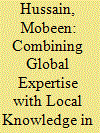

|
|
|
|
|
| Summary/Abstract |
This article traces the evolution of branded commodity advertising and consumption from corporeal health concerns to the racialisation of beauty through skin-lightening cosmetics in late colonial India. It centres two empirical foci: the marketing of personal hygiene products to Indian markets, and their racialised and gendered consumption. This article argues that the imperial economy tapped into and commodified ideals of cleanliness, beauty and fairness through marketing—ideals that continue to pervade contemporary South Asian communities. Contrary to claims that multinational corporations permeated Indian markets after the economic liberalisation of the late 1980s, there is a much deeper genealogy to the racialised imperial economy operating in European colonies. This article also examines the phenomenological underpinnings of imperial whiteness in colonial encounters to demonstrate how certain commodities appealed to Indians as ‘modern’ consumers, as well as how middle-class Indians and local entrepreneurs became active participants in the demand for, consumption and production of personal hygiene commodities.
|
|
|
|
|
|
|
|
|
|
|
|
|
|
|
|
| 3 |
ID:
181684
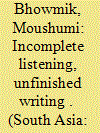

|
|
|
|
|
| Summary/Abstract |
Keramat Ali, a colonial soldier from Mymensingh in Bengal, was among the hundreds of people whose voices were recorded by the Prussian linguist Wilhelm Doegen in the Halfmoon POW Camp in Wunsdorf, Germany, during 1917–18. Some years later, Sawabali, an oilman from Sylhet, was recorded in 1934 by the Dutch ethnomusicologist Arnold Bake on board a ship sailing to Europe. Closely listening to these archival recordings in conjunction with one another, this essay considers the dual possibility of writing about sound and silence as historical evidence of empire while also writing microhistories of the worlds held within the recordings as worlds unto themselves, independent of the global and the imperial.
|
|
|
|
|
|
|
|
|
|
|
|
|
|
|
|
| 4 |
ID:
181678


|
|
|
|
|
| Summary/Abstract |
This essay serves as an introduction to a special section on the senses in late colonial India. Participating in the act of decolonising sensory studies, this collection explores the intersections between post-colonial studies and sensory studies by paying particular attention to the sensorium of the colonised. In the historical and geographical context of colonial South Asia, the senses are embedded in acts of distinction across race, caste, class, and bodily and gender hierarchies. The collection intervenes by paying attention to the relationship between power and sense perception as it finds register in media, scientific practices and literature of the period. Across the section, we suggest that making sense of empire is also to make sense of the sensory regimes of empire that have resonances in the contemporary.
|
|
|
|
|
|
|
|
|
|
|
|
|
|
|
|
| 5 |
ID:
181676
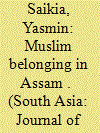

|
|
|
|
|
| Summary/Abstract |
How did the Muslims of Assam become outsiders in Assam? This essay attempts to answer this question by probing the colonial and post-colonial history of categorising people that has located Muslims outside the category of ‘Assamese’. The political effort to make the Assamese into a homogenous Hindu group undoes the xanmiholi or blended humanity of Assam. By focusing on two Muslim communities—the Goriyas or Assamese Muslims and the Miyas or Muslims of East Bengali origin—this essay explores the project of making Muslims outsiders in Assam. Finally, the essay examines the inclusion of the transplanted tea-tribe communities as a possible resolution to the Muslim situation in Assam.
|
|
|
|
|
|
|
|
|
|
|
|
|
|
|
|
| 6 |
ID:
181674
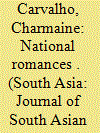

|
|
|
|
|
| Summary/Abstract |
Both the novel’s contribution to the imagining of nations and the role romance plays in this project have been well established. The emergence of chick lit, which tracks the fortunes of a single, young, urban protagonist in post-liberalisation India, offers a lens through which to view the intersection of the neo-liberal economy, nationalism and gender. This study examines two chick lit novels by popular author Anuja Chauhan, showing how they layer romantic union with a fantasy of India that embraces diversity, underpinned by a woman who is able to resolve various dichotomies.
|
|
|
|
|
|
|
|
|
|
|
|
|
|
|
|
| 7 |
ID:
181675
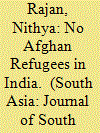

|
|
|
|
|
| Summary/Abstract |
This article locates the Government of India’s refusal to grant refugee status to Afghans in Delhi in the aftermath of the Soviet invasion of Afghanistan in 1979 within the Cold War politics of the era. I trace this history through internal communications of the Ministry of External Affairs of the Government of India from 1979 to 1983. I argue that the Indian government’s response to Afghan arrivals was shaped by geopolitical and diplomatic contingencies rather than humanitarian ones. I also examine the intertwined history of Afghan refugees and the establishment of the United Nations High Commissioner for Refugees’ office in Delhi, India.
|
|
|
|
|
|
|
|
|
|
|
|
|
|
|
|
| 8 |
ID:
181681
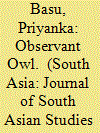

|
|
|
|
|
| Summary/Abstract |
The proliferation of print in mid nineteenth century Bengal witnessed several self-reflexive exercises in writing that tried to capture the incongruence between the colonial administration and indigenous everyday lives. Hutom Pyanchar Naksha (or The Observant Owl) written by Kaliprasanna Sinha (1862) is possibly the closest representation in print of such incongruities. This article focuses on the text of Hutom in relation to visual representations and reports by the colonial administration in contemporary English newspapers like The Hindoo Patriot, The Bengal Harkaru and others. In doing so, it will highlight the sensory world of colonial Calcutta that is so vividly captured in Hutom.
|
|
|
|
|
|
|
|
|
|
|
|
|
|
|
|
| 9 |
ID:
181677
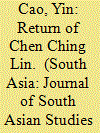

|
|
|
|
|
| Summary/Abstract |
During World War II, thousands of Chinese soldiers were sent to India for training. Many of them deserted from the army and made a new life in India. Chen Ching Lin was one of these deserters. Following the course of his journey in India from 1943 to 1946, this article not only unearths the little-known experiences of the Chinese deserters in India, but also explores how the Chinese Nationalist Government’s aim to discipline the overseas Chinese communities conflicted with the agenda of British geopolitics. It further contends that modern Chinese and Indian history could be integrated into a single narrative framework from subaltern perspectives.
|
|
|
|
|
|
|
|
|
|
|
|
|
|
|
|
| 10 |
ID:
181682
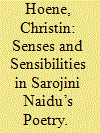

|
|
|
|
|
| Summary/Abstract |
The senses play a crucial role in the poetry of Sarojini Naidu (1879–1949), both on the level of theme and on the level of aesthetics. Throughout this essay, I show how Naidu creates multisensorial sensescapes that evoke the Indian aesthetic principle of rasa, which literally translates into English as ‘juice, essence, or taste’ and which, in the context of aesthetic theory, denotes the emotive essence of and response to a piece of art. The early twentieth century saw a revival of classical Indian aesthetics, including rasa. Translating this ancient Indian aesthetic principle into modern poetry in English, Naidu harks back to a pre-colonial cultural idea(l) in order to form a national identity that is independent of the coloniser’s political and cultural imperialism.
|
|
|
|
|
|
|
|
|
|
|
|
|
|
|
|
| 11 |
ID:
181683
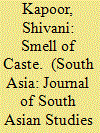

|
|
|
|
|
| Summary/Abstract |
Leather was an important commodity for the British empire in terms of industrial production and scientific innovation. From the mid nineteenth century in India, the British sought to convert leatherwork into a scientific industry. Leather, however, also has a life in caste. The profound stench inherent to the process of leather tanning marks leather workers as polluted. Examining archival material and contemporary ethnography from Uttar Pradesh, this paper examines how the scientific colonial intervention in leatherwork was made complicated due to the sensorial politics of caste. The leather chemist, trained to impart scientific knowledge to leather workers, often failed to negotiate the caste-based sensorial nature of leatherwork, thereby allowing caste to limit the reach of modern science in the industry. Understanding this interaction between colonial science and leatherwork has important consequences for our understanding of the politics of caste and scientific knowledge in India.
|
|
|
|
|
|
|
|
|
|
|
|
|
|
|
|
| 12 |
ID:
181679


|
|
|
|
|
| Summary/Abstract |
Hunting encompasses a range of sensory experiences such as sight, smell and taste (game as food). On the tea frontier of British Assam, such a sensory world of hunting was closely connected to the ideas and practices of empire, as well as to the production of the global commodity of tea. In this regard, A.R. Ramsden’s memoir, Assam Planter: Tea Planting and Hunting in Assam (1945), provides a rich illustration of sensory experiences in the making of such a tea frontier and a global commodity. Furthermore, the memoir is constituted through the complex interplay of senses that is mapped onto the plantation social order. In the process, the sensory experiences of the ‘sahib’ and the ‘native’ are organised in an imperial narrative of tea and frontier-making. Yet, given its historical moment, the context of imperial crisis is also reflected in the memoir through the contradictions of sensory experiences and, thereby, the problems faced in producing the imperial narrative of tea and frontier-making.
|
|
|
|
|
|
|
|
|
|
|
|
|
|
|
|
|
|
|
|
|